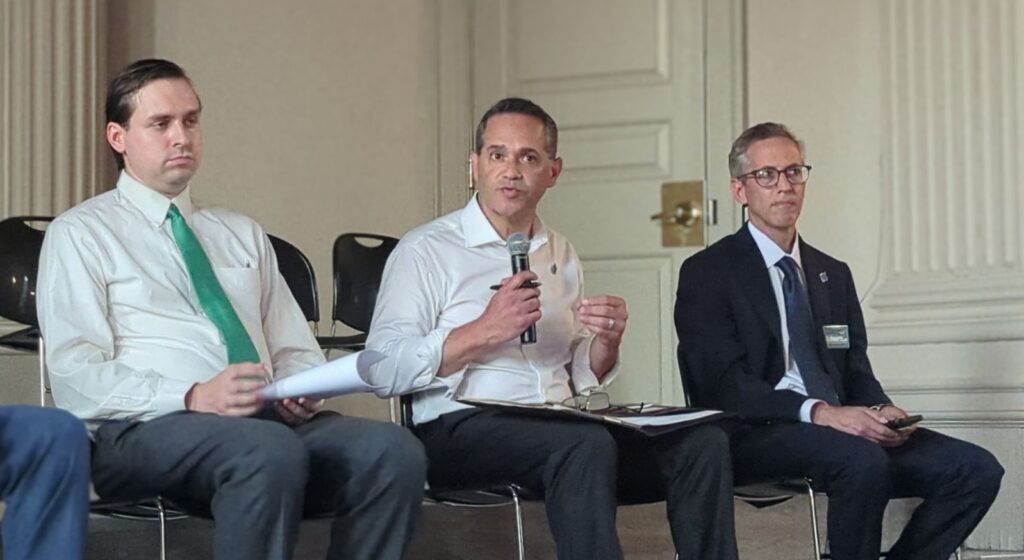Newton’s candidates for state representative debated climate change and environmental policy Thursday evening at Newton City Hall.
Amy Sangiolo and Alex Jablon are competing for the Middlesex 11th district seat, while Rick Lipof, Greg Schwartz and Bill Humphrey are running for the Middlesex 12th district seat.
Here are some highlights from the debate.
Gas distribution
The first question asked what should be done about the gas distribution system in the state.
Sangiolo recommended repairing instead of replacing existing gas lines in order to transition off of gas for energy.
“We need to require the gas companies during the transition repair and not replace these gas lines,” Sangiolo said. “We also need to facilitate the transition of gas.”
Jablon said the government should do better at quickly identifying and fixing gas leaks as it moves to reduce reliance on fossil fuels. “We definitely need to bring more attention to identifying and then fixing these as soon as possible,” Jablon said. “Is a short term safety concern. It is a long term climate and health concern.”
Humphrey echoed the need to get off fossil fuels and said that the government should give its citizens access to clean energy.
“I think most people want to, so it’s a question of making sure they have the resources and ability and we know what we need to do for a clean green future,” Humphrey said.
Lipof said that the permitting process for clear energy projects must happen quicker so that clean energy is easily accessible.
“We will not be able to go completely electric unless we solve the beginning process,” Lipof said.
Schwartz said that there should be a statewide ban of gas infrastructure in all new construction.
“We need to ban gas in new construction of schools, municipal buildings, commercial and residential properties,” he said.
Emissions reduction in building and transportation
The moderator questioned candidates on what they, as state representative, could do about reducing emissions in building and transportation.
For the 12th district debate, Humphrey said that he hopes to expand on the 10 Communities Program, a state initiative allowing 10 cities and towns to ban fossil fuel infrastructure in new construction.
Lipof echoed the need to expand 10 Communities and said that several of Newton’s T stations aren’t taking money, which is losing transportation money for the state.
“If we don’t have a robust transportation system, then we’re not doing our job,” Lipof said.
Schwartz described the link between housing and public transport, saying that the state should improve its transportation to make its communities cheaper and more accessible places to live.
“We can bring online a huge amount of additional reasonable cost housing, if we have the kinds of transportation options that we need in areas of the state that are currently underserved,” Schwartz said.
Jablon said that incentives for developers to switch to clean energy in construction projects would make a difference for the state’s climate goals.
“Cost is a big barrier to adoption, and that’s definitely something that we can help with,” Jablon said. Sangiolo emphasized the need to electrify public transit while also allowing for biking and walking in the city.
She also expressed disapproval of the planned I-90 Allston project that would add more traffic lanes and reduce green space.
“We need to incentivize people not to take their cars into Boston, but to take public transit,” Sangiolo said.

Transparency
The moderator asked if candidates support a bill proposing requirements for state representatives to post committee votes on public websites, or one that would make representatives schedule hearings earlier so that advocates can better plan to participate.
Schwartz mentioned his experience working for legislators in the House of Representatives, the Senate and the House of Commons in the UK, saying that he is surprised at the lack of transparency from the Massachusetts state house.
“Our legislature where democracy, we’d like to say, was born, needs to be as transparent as possible,” Schwartz said.
Lipof promised to report his votes in a newsletter if he were elected, but said that progress for transparency in the state house will likely be slow.
“You need political acumen, you need relationship skills, you need building bridges in order to effect any change,” Lipof said.
Humphrey said that representatives should schedule hearings further in advance so that regular people, not just professional lobbyists, can weigh in on issues that are relevant to them.
“I think that’s especially key to understand when it comes to the environmental agenda,” Humphrey said. “We don’t want hearings to just be dominated by professional advocates.”
Sangiolo mentioned that she’s been sending an e-newsletter to residents since 2015 to publicize her (Board of Aldermen) committee reports and voting record.
“It’s really important to understand what those trade-offs were that were made in committee as they’re making their decisions,” Sangiolo said.
Jablon pledged to sign a petition from Act on Mass that asks state legislators to make committee votes and testimony available, as well as stand for roll call to record votes.
“There are only three candidates that have signed on so far that are not incumbents,” Jablon said. “I will be signing that this week.”